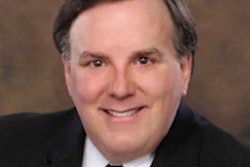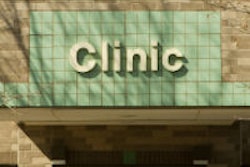
A documentary that aired last night on the PBS "Frontline" program took a long, hard look at a "ruptured" U.S. dental care system in which the poor have little access to care outside of jammed public clinics and hospital emergency rooms.
The "Dollars and Dentists" documentary, the product of a yearlong investigation, revealed how factors such as low Medicaid reimbursement and the dental establishment's opposition to alternative care providers often leave desperate patients vulnerable to the predatory tactics of some dental chains.
“This is a crisis and we need to fix it.”
— Frank Catalanotto, DMD, University
of Florida College of Dentistry
Poor and elderly people with painful dental problems must confront insurmountable barriers to get dental care because few dentists will take Medicaid patients while Medicare doesn't cover it, according to the "Frontline" documentary. The program showed how lack of access often affected patients' whole lives: The people interviewed described not being able to eat, talk, or get jobs due to untreated caries, abscesses, and missing teeth.
And when people could finally get care from clinics such as those offered by Remote Area Medical (RAM) around the country, dentists often can do little but extract rotting teeth, the report noted.
"This is a crisis and we need to fix it," noted Frank Catalanotto, DMD, a professor and chair of the department of community dentistry and behavioral sciences at the University of Florida College of Dentistry.
The rise of corporate dentistry
With few alternatives available, many patients turn to corporate dental chains like Kool Smiles, which specializes in treating children on Medicaid, "Frontline" noted. The rapidly expanding company has grown from two offices in 2002 to 120 offices nationwide.
However, most corporate dental chains are owned by private equity firms, which are driven by profit and can pressure dentists to do expensive procedures such as stainless steel crowns and pulpotomies, according to the "Frontline" report. Several states have investigated dental chains, resulting in multimillion dollar settlements following complaints of unnecessary care, inflated billing, and Medicaid fraud.
A former Kool Smiles office manager described having to meet daily quotas of $15,000 worth of treatments and the lure of bonuses if patients could be signed up for contracts requiring thousands of dollars for procedures that frequently were unnecessary or questionable. When "Frontline" reporters asked how a dentist could earn a $6,300 bonus by doing $5,000 worth of work in one day, the office manager replied, "She's on roller skates."
"Frontline" reporters questioned Kool Smiles executives about why so many young children were given higher-priced steel crowns instead of fillings. Mothers also described horrific lengthy procedures for their children in which Kool Smiles dentists had trouble placing several crowns, which sometimes fell out afterward.
A member of the Connecticut dental board described the spike in steel crowns after the state raised Medicaid reimbursement rates. An investigation showed overtreatment by Kool Smiles dentists, poorly done pulpotomies, and ill-fitting crowns. The company subsequently acknowledged substandard work.
But Kool Smiles executives played down such problems, noting that 74% of their patients return for more dental care.
Sen. Charles Grassley (R-IA) questioned whether dentists at dental chains are free from corporate pressures to maximize profits. Grassley, the ranking member of the Senate Finance Committee, has been investigating several private-equity-owned chains.
Questionable treatments at dental chains not only exploit the poor but also waste taxpayers' money by gaming the Medicaid system, he said.
But "Frontline" also offered a positive view of one dental chain: Alabama's Sarrell Dental Center, the largest single provider of Medicaid dental services in Alabama. Sarrell treats 300,000 children annually at its 15 clinics and has been applauded for the quality of its care. But Sarrell has also clashed with the Alabama Dental Association over concerns about competition. Tom Willis, DMD, former president of the Alabama Board of Dental Examiners, acknowledged that the conflict partially stemmed from dentists' efforts to protect their turf.
Financial services questioned
The "Frontline" documentary also looked at credit cards that chains like Aspen Dental often recommend for their patients. Aspen Dental has 350 offices in 22 states and treated 750,000 patients in 2012.
The report noted that New York Attorney General Andrew Cuomo investigated GE Money's CareCredit service and other healthcare credit card providers after receiving hundreds of complaints from patients who said they were billed for procedures they didn't receive, billed for work done improperly, overbilled for services, or signed up for such cards without their consent.
An 87-year-old woman described going to Aspen Dental to get two teeth fixed and how she was pressured into signing up for $12,000 worth of work on a third-party credit card. Her son noted that the interest began accruing on the credit card before her treatments even began.
Aspen Dental has paid a $175,000 settlement following an investigation by Pennsylvania state investigators over misleading information about discounts, coupons, and interest-free financing, "Frontline" noted.
"They wanted us to sell Cadillac dentures and gave us monthly bonuses if we did," said Heather Haynes, a former Aspen Dental office manager.
But state dental regulators say they are hamstrung to control predatory practices by dental chains because they only have authority over licensed dentists, not corporations.
Jeffrey M. Cole, DDS, MBA, FAGD, president of the Academy of General Dentistry (AGD), issued the following statement regarding the "Frontline" program:
"Although complex in nature, this issue is not so complex that it cannot be solved," Dr. Cole said. "The dental community needs the cooperation of key decision-makers to help organized dentistry move forward and implement the solutions that will lead to better oral health for all Americans. That is what any dentist -- and any AGD member -- would want."
Watch Dollars and Dentists on PBS. See more from FRONTLINE.



















